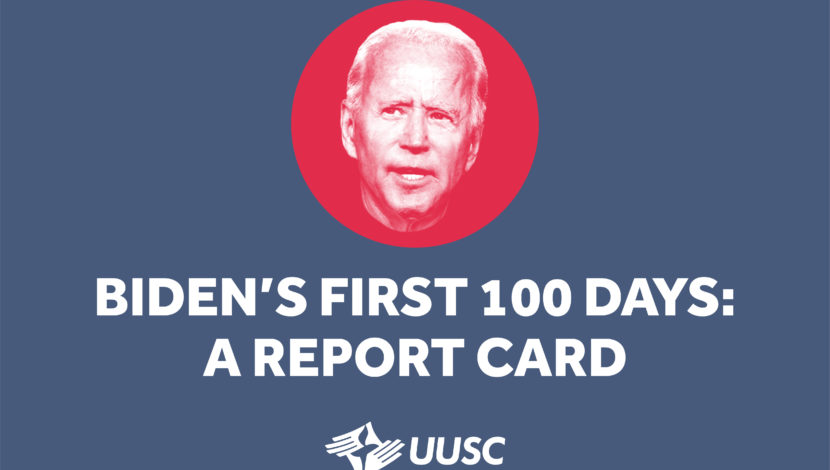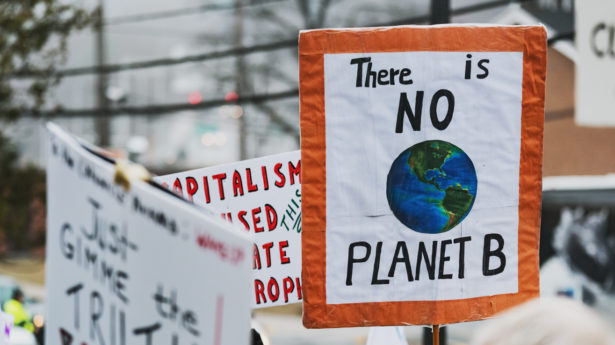The Unitarian Universalist Service Committee advances human rights through grassroots collaborations.
A 100 Day Progress Report on President Biden’s Human Rights Goals

By on April 29, 2021
On January 20, Joe Biden and Kamala Harris took office with bold and inspiring commitments to advance human rights. Their administration also began alongside new Congressional leadership in both the House and the Senate, which brought an end to an era of divided government and created new opportunities for the executive and legislative branches to work together on human rights priorities that require Congressional action.
In the weeks that followed, UUSC put out a list of immediate steps the new White House and new Congress should take to make good on their promises in their first 100 days in office. These demands were based on the longstanding advocacy goals of our grassroots partners and the broader social movements of which UUSC is a part. As the deadline of 100 days draws to a close on April 28, we look back on these demands and assess the administration’s progress toward meeting them, across five different thematic areas.
Pandemic Justice (Grade: B+)
What did we ask for?
- Provide universal and non-discriminatory access to the COVID-19 vaccine
- Survival checks for all U.S. residents, regardless of immigration status
- Moratoriums on electricity and water shutoffs; universal access to broadband and other public utilities
- Include a path to citizenship for DACA and TPS holders and undocumented essential workers
What did we get?
The Biden/Harris administration has made considerable progress toward addressing the COVID-19 public health emergency, particularly in their effort to achieve widespread and equitable immunization against the virus (at least in the United States), and to work with Congress to enact robust COVID-19 relief, which has already passed in the form of the American Rescue Plan. With much to celebrate in this progress, however, there is also more the administration and Congress must do to advance a truly just response to the pandemic, particularly with respect to vaccine access in the Global South.
Needs improvement:
COVID relief legislation that the White House championed, and which ultimately passed in Congress, improved on some previous forms of relief by making sure that U.S. citizens living in mixed-status families received stimulus checks. However, many immigrant taxpayers without social security numbers continued to be unfairly excluded from these payments, even as they worked disproportionately on the front lines of the pandemic and had the same need for survival checks as everyone else. Relief legislation also failed to include a pathway to permanent residency for immigrant essential workers. Finally, Congress and the White House could have done much more to address the global humanitarian crisis brought on by the pandemic, far beyond U.S. borders. For example, President Biden needs to make good on his promise to waive intellectual property restrictions currently blocking wider access to the COVID-19 vaccine in the Global South. With the pandemic raging out of control in India and elsewhere, the need is more acute than ever for Biden to do all in his power to ensure the vaccine is widely available throughout the globe.
Racial Justice (Grade: C+)
What did we ask for?
- Work with Congress to pass the Breathe Act and address structural racism
- Demilitarize the police by halting the transfer of surplus military equipment to police departments
- Restore federal oversight of local police departments with records of misconduct, brutality and structural racism
What did we get?
Biden and Harris took office amidst a nationwide movement to advance racial justice and to dismantle the white supremacy and anti-Blackness that are deeply entrenched in U.S. institutions, including in the policing, incarceration, and criminal legal systems. The new president and vice president promised to make racial equity a core focus of their administration, which they began with a series of executive orders to advance these goals and address environmental racism.
Needs improvement:
When it comes to making real changes to structurally-biased policing and incarceration systems in this country—both through executive action and by working with Congress—the administration’s follow-through has been hit-or-miss. They did suspend contracts with new privatized prisons, but—after 100 days in office—they have still not restored a ban on transfers of military-grade equipment to local police departments, despite the fact this program has been linked to higher rates of police violence. We applaud the steps Attorney General Merrick Garland has taken to reinstate Obama-era federal oversight of local police departments with records of systemic racism and misconduct; however, action is also needed on a much broader scale—with the support of Congress—to enact the provisions of the Breathe Act, which would address multiple dimensions of the structural racism in U.S. society.
Migrant Justice (Grade: D)
What did we ask for?
- Halt all deportations, expulsions, and transfers between detention facilities
- Expedite the humanitarian release and parole of detained immigrants
- Restore access to asylum and end anti-asylum restrictions
- End all forms of family detention
What did we get?
Biden and Harris moved swiftly in their first days in office to reverse several of the Trump administration’s most egregious anti-immigrant policies—at least on paper—but these moves seldom translated into real improvements in the human rights situation for immigrants and asylum-seekers. This is due in large part to the fact that the administration continued to enforce other, even worse Trump administration policies that block and return people to harm.
Needs improvement:
Despite promising to restore access to asylum and refuge in the United States, the administration has backtracked on these commitments. After 100 days in office, the Biden administration continues to carry out categorical exclusions and removals of families and adults at the U.S. border—without any due process or access to an asylum screening—under a Trump-era policy known as Title 42. In some cases, this results in the expulsion of vulnerable asylum-seeking families across oceans on crowded deportation flights, to Haiti and other countries that the U.S. government has deemed unsafe, all in the midst of a pandemic. The Biden administration also continues to operate ICE family detention centers, despite pledging on the campaign trail to end this practice. To make good on his promises, Biden must immediately and permanently shut down family detention centers, end the use of Title 42, stop expelling families and adults, and restore access to asylum at U.S. ports of entry.
Climate Justice (Grade: B)
What did we ask for?
- Reverse Trump’s harmful policies encouraging the production of pollutants that harm the environment
- Halt construction of new fossil fuel projects on public lands
- Work with Congress to support a just transition to a post-carbon economy
What did we get?
The Biden/Harris administration has begun the process of reviewing Trump-era regulations that permitted corporations wider latitude to dump pollutants and toxins into the environment, often disproportionately harming communities of color (the definition of environmental racism). We continue to urge that these regulations be quickly overturned. Meanwhile, we applaud the Biden administration for appointing former representative Deb Halland to oversee the Department of the Interior, and we urge Secretary Haaland and the administration as a whole to make protecting public resources from harmful extractive projects a priority.
Needs improvement:
The administration needs to make good on its commitments not only by appointing the right people or saying the right things, but through concrete action. While we welcome the administration’s decision to halt construction of the Keystone XL pipeline, they must do the same for the Dakota Access and Enbridge Line 3 pipelines, which likewise threaten the earth’s climate and violate Indigenous sovereignty. Internationally, the Biden administration must increase its ambition and commitments to cut back on greenhouse gas emissions and ensure a just transition to a post-carbon economy. They did issue a more robust nationally determined commitment in recent climate talks, but their pledge still falls short of what is needed to pay the United States’ fair share of climate costs, in light of the country’s historic contribution to the underlying problem. They must increase this commitment to cover an equivalent of 195 percent reductions, both through directly cutting U.S. greenhouse gas emissions and covering at least $800 billion worth of mitigation, adaptation, and loss and damage costs from climate change to countries in the Global South.
International Justice (Grade: A-)
What did we ask for?
- Support efforts to label genocidal acts in Burma and demand justice and accountability
- Strengthen targeted sanctions against individuals responsible for acts of genocide
- Use authority to sanction military-owned enterprises in Burma that support genocide
What did we get?
Dramatic events in Burma/Myanmar stemming from the February 1 military coup led to a long-overdue shift of U.S. government policy toward the oppressive ruling regime of the Southeast Asian nation. We applaud the Biden/Harris administration for responding swiftly to the events of February 1, through instituting stronger targeted sanctions against military officials responsible for the coup, as well as by sanctioning the conglomerate enterprises that the Burmese military has long used to fund its atrocities. These actions fulfill two of our three demands for Biden’s first 100 days, and come alongside other positive changes in the U.S. government’s approach to Burma, including a commitment to rethink U.S. aid policy to the country to better prioritize human rights.
Needs improvement:
While the U.S. government has taken welcome steps to hold the Burmese military accountable for their attack on the country’s elected government, we are still waiting for the Biden/Harris team to connect these recent events to prior military atrocities, for which there has still been no justice and redress—most glaringly, the Burmese military’s genocide against the Rohingya people and their crimes against the country’s many other ethnic minorities. The February 1 coup underlined the abusive nature of Burmese military institutions and the hostility of senior Burmese military officials to the goals of democracy and human rights. U.S. leaders must make the logical connection to the military’s earlier abuses by recognizing the crimes against the Rohingya as a genocide, financing ethnic minority-led civil society in the region, and supporting efforts through international institutions to seek justice for Rohingya survivors.
***
About UUSC: Guided by the belief that all people have inherent worth and dignity, UUSC advances human rights globally by partnering with affected communities who are confronting injustice, mobilizing to challenge oppressive systems, and inspiring and sustaining spiritually grounded activism for justice. We invite you to join us in this journey toward realizing a better future!
Photo Credit: UUSC

